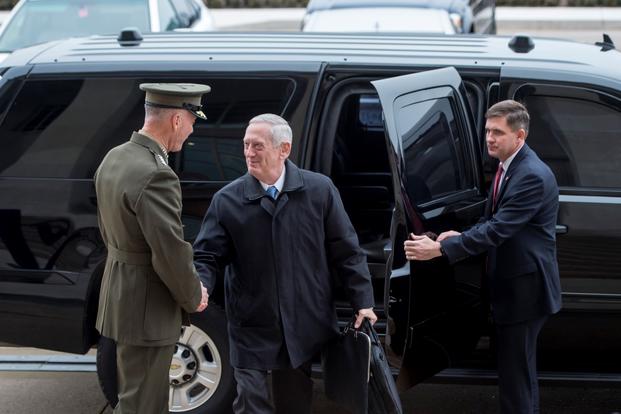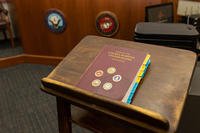Hours after he was sworn in, retired Marine Gen. James arrived at the Pentagon Saturday for the first time as the nation's 26th Secretary of Defense.
Mattis, carrying two briefcases, stepped out of a black sport-utility vehicle and was greeted at noontime on the steps of the Pentagon's River Entrance by Joint Chiefs Chairman Gen. Joseph Dunford, who served under Mattis as a regimental commander in the 2003 invasion of Iraq.
Neither Mattis nor Dunford made any comment as they quickly entered the building, but Mattis said in an earlier statement that "it's good to be back" after three years in retirement.
The historic moment of Mattis' arrival passed without fanfare. He was only the second defense secretary since World War II who needed a special waiver from Congress to accept the position.
Members of the military are barred by law from becoming defense secretary until they have been retired for at least seven years in the interests of preserving civilian control of the military. Mattis retired in 2013.
The House of Representatives and the Senate voted to grant Mattis the waiver and President Donald Trump signed it shortly after his inaugural address Friday, putting the former head of Central Command in the company of Gen. George C. Marshall, the Army chief of staff in World War II, as the only Defense Secretaries who needed special permission from Congress to take the job.
The Senate voted late Friday 98-1 to confirm Mattis as Defense Secretary. The lone dissenting vote was cast by Sen. Kirsten Gillibrand, a New York Democrat who had praised Mattis military leadership but voted "no" on the issue of civilian control.
At the White House Friday night, Mattis was sworn in by new Vice President Mike Pence, making him the first of Trump's cabinet nominees to be cleared to begin work. Retired Marine Gen. John Kelly was sworn in as secretary of Homeland Security immediately after Mattis.
In his statement to the nearly three million Pentagon uniformed and civilian personnel, Mattis was typically blunt. While he has the watch at the department, "Every action we take will be designed to ensure our military is ready to fight today and in the future," Mattis said.
Mattis also returned to a message he stressed in his Senate confirmation hearing on the need to shore up alliances around the world and work in close coordination with the State Department to avoid conflict.
"Recognizing that no nation is secure without friends, we will work with the State Department to strengthen our alliances" while seeking to gain "full value from every taxpayer dollar spent on defense," he said.
Trump has hailed Mattis as the "real deal" in leadership and praised him again at the Armed Forces Ball Friday night after the inaugural, but the question remained on how well they will work together on defense.
Mattis has already staked out positions seemingly at odds with those of Trump. Mattis has warned against trusting Russian President Vladimir Putin while Trump has said he will seek cooperation. Trump has called NATO "obsolete" while Mattis backs current efforts to bolster the alliance.
-- Richard Sisk can be reached at Richard.Sisk@Military.com.























